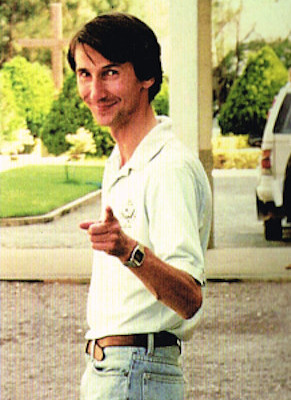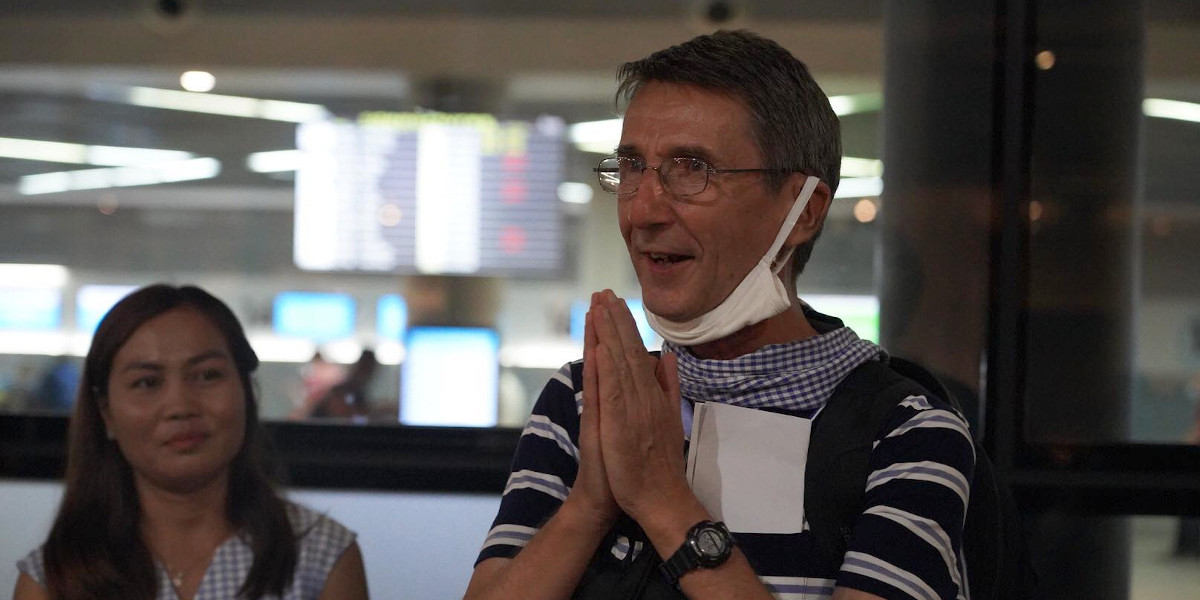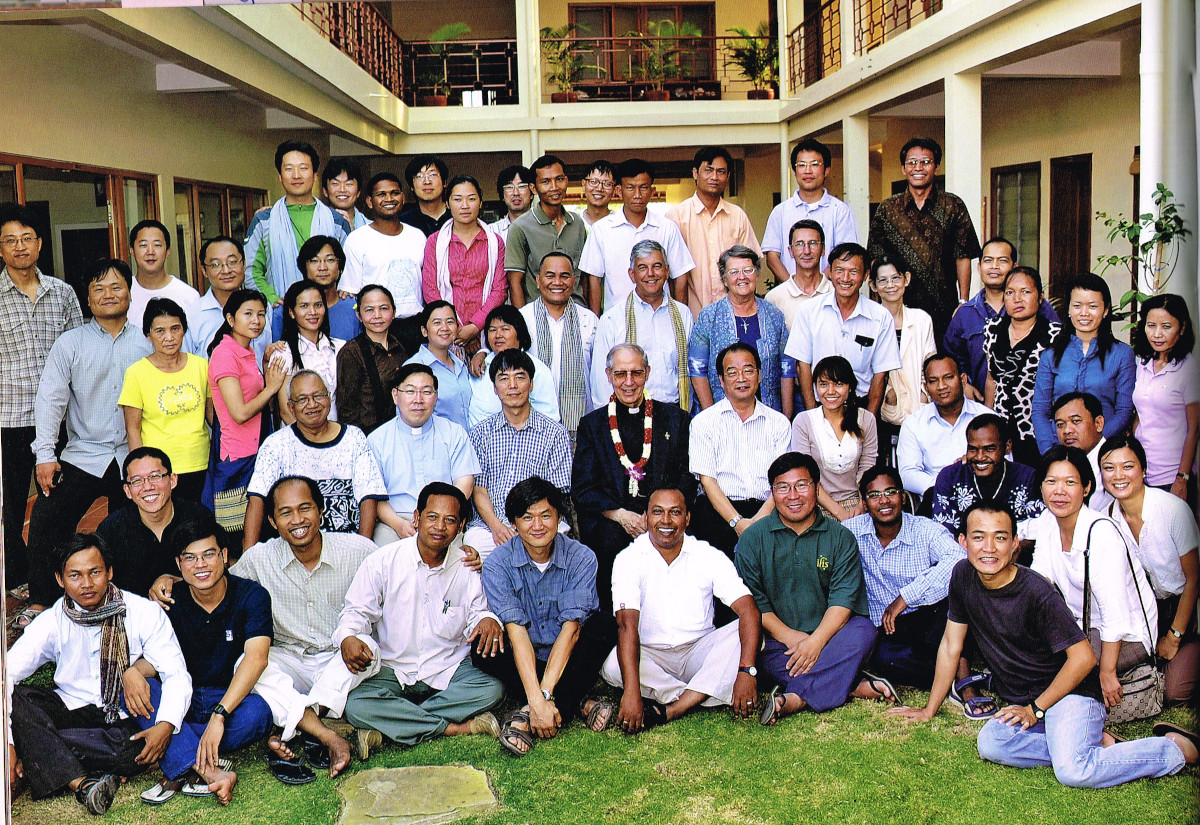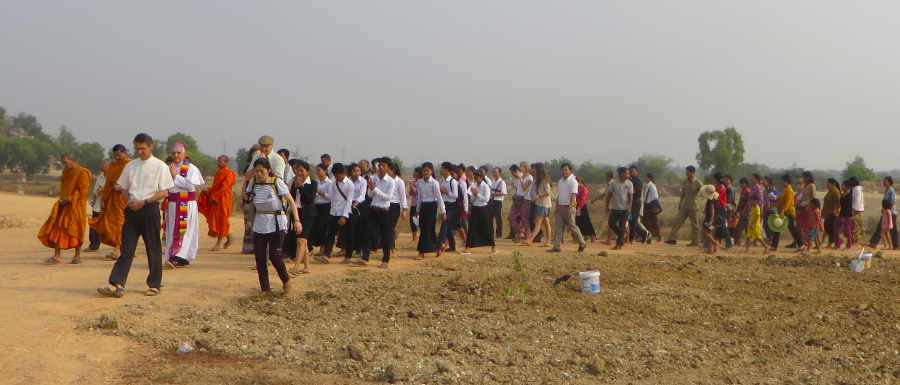At first a reluctant missionary, Irish Jesuit Fr Ashley Evans ended up in Southeast Asia for nearly three decades, first with Jesuit Refugee Service in Thailand and then as a pioneer of the Cambodian Mission for 27 years. Now back in Ireland, he talks about his work with the youth, his years as an educator, and the lessons he learned.
After your Regency in Ireland, you volunteered for a “second” Regency, which is not very common.
When I did philosophy in France, I was very impressed by the Mission-Ouvrière—the movement started by French worker-priests. Actually it was the end of an era, but I didn’t realise it at that time. There were some French Jesuits who were involved with heavy industry all their lives and when I went to their meetings I was really impressed with their closeness to poor people, the authenticity and integrity of their commitment. I asked my superiors to allow me to do that for my Regency, but they said, no, we need you to teach in the school. Actually, I was happy in the school, but after that, Fr Arrupe had started the Jesuit Refugee Service (JRS). I proposed this work as an alternative to the worker mission idea. I was the first one from the Irish Province to do Regency at JRS.
I ended up in the Cambodian camp being a teacher trainor. While I was teaching mathematics to primary and middle school teachers, I was learning Khmer. I would put an equation on the board, and start solving the equation and asking them the words for this and for that. That was the way they understood the maths and how I understood Khmer. And at the end of two years, I was able to have a conversation and teach a class in Khmer.
After ordination, you went back to Southeast Asia, this time to Cambodia.

At the parish, they only had one parish priest for the whole network of small communities around Phnom Penh, so I went there on the weekends. After four years I actually moved into the parish. I really loved that as I was part of the parish and at the same time doing my university work. And then poor students started arriving from the hostels in the countryside, and the bishops wanted to set up a student hostel to house them. It became the Catholic Church Student Centre (CCSC). I was in charge of the hostel for about 10 years in two stints. I really enjoyed that work. I got to know the young people who stayed there very well; they became my friends after they left and got married and had their own families. Some of them became really active lay leaders in the Cambodian church.
As well as teaching Mathematics at the Royal University of Phnom Penh (for 20 years), I also taught the History of Philosophy for seven years. So with a group of students, we translated 33 texts from different authors so that we could have a kind of seminar each week with the students presenting and debating these texts, after which I tried to clarify the main issues and arguments. The book is called “Readings in Philosophy from Plato to Marx”. It was the first time for students to be able to access texts in the Khmer language. Before the Khmer Rouge time, all the University education in Cambodia was through the French language. So nobody had ever tried to translate the original authors into Khmer. I edited the 5th edition of this book just before I left.
Then in 2013, the Jesuits set up a school in Sisophon.
It took a long time for the Jesuits to realise it wasn’t enough to have somebody teaching at the university, and that we had a bigger contribution to make. Many times we had a talk about education. In fact, the initiative that came to fruition in 2013 was the fifth time we had considered the possibility of starting a school. In 2010, we had gone under the Korean Province, and they took more responsibility for long term planning.
We took three years, between 2010 and 2013, to plan and prepare the project. We had to work hard to find a common project with a common vision that we could all support. Fr Adolfo Nicolás was then the General. The Korean Provincial went to him in 2012 and he said you haven’t prepared this project properly, you haven’t thought of the alternatives, you’re not really responding to the educational needs. But from that time on, Mark Raper was very helpful and we took all his questions and worked at it again for another year. And then when we sent the revised project to him in 2013, he said yes. And so we started. They needed someone to do it, so I had to resign from my work in Phnom Penh and move to Sisophon. We started with kindergarten–this was the wisdom of the Salesian sisters who advised us, if you really want to have quality education, that’s where you have to start. The Hong Kong Lay Missionary Association person was really good for the early childhood education. The Cambodian Ministry of Education, Youth and Sport was very supportive and the local officials were very helpful, so it grew fast. I was there for four years and by the time I had finished we had already started the secondary school, and the primary school was already motoring along also.
When we were trying to get consensus for this project, it was very clear that all on our team–both Jesuits and our partners on the mission–wanted the school to be oriented to helping poor people. The original plan to have it near Phnom Penh was not acceptable to a large group because they felt that rich people would slowly take over the school and we would lose our focus on the poor. That is why it’s in Sisophon, in a remote area. But even there, it will be a struggle to keep the orientation for the poor.
After 27 years as a missionary in Asia, what do you bring back?
I have learned an awful lot about myself, God, and the Society of Jesus… but also about cultures, especially modern culture. Even during my last two years in Battambang while teaching at the Battambang Teacher Education College and Universities there, and living at the Tep Im Student Centre, I was still learning. I was with Cambodian youth all this time, either teaching or with them in hostels. I can see that the international, sort of modern “pop culture” spreads everywhere. And students are very influenced by this culture — K-pop, movies, music. At the same time, they have their own traditional culture inside themselves. They’re struggling to make them fit together and somehow they don’t really fit together. I think that is also the experience of many young people in lots of other different places. There’s this French priest who said to me, “You know, sometimes I think the young people in my parish here are closer to the young people in my parish in France than they are to their parents.” It’s this modern culture where the Gospel has to be preached and witnessed to now. And that’s a real challenge.
Another challenge is Buddhism. We had a long and serious contact with Buddhism and its robust spiritual tradition. There is a discerning capacity there inside the Buddhist tradition that is very impressive. Dialogue with Buddhism is going to be really significant for the church in the future.
Another thing I take with me — we worked in mixed teams. I had lay partners when I was setting up the student centre; I had Cambodian lay people and the Hong Kong lay missionary when I was setting up the school. This cooperation between groups as mixed teams rather than one person making all the decisions — this was crucial in the success of everything, in anything I did there. It’s something I had to learn, really.
Something I really take back with me is the emphasis on discerning together. Not just working as a team, but discerning and long term discernment. We learned a lot through the process of setting up the school project. That took three years and we really had to–more or less–get consensus. This was like communal discernment, and the consensus was the sign that we were responding to God’s call and God’s will. That was very important.
Afterwards, I felt the Society emphasising the apostolic priority of the Spiritual Exercises. Rediscovering the dynamism of the Spiritual Exercises is really appropriate. We Jesuits can go into different directions, do great work in lots of different directions, but then lose our focus. The Spiritual Exercises bring us right back to what is the fundamental option we are making and why.









